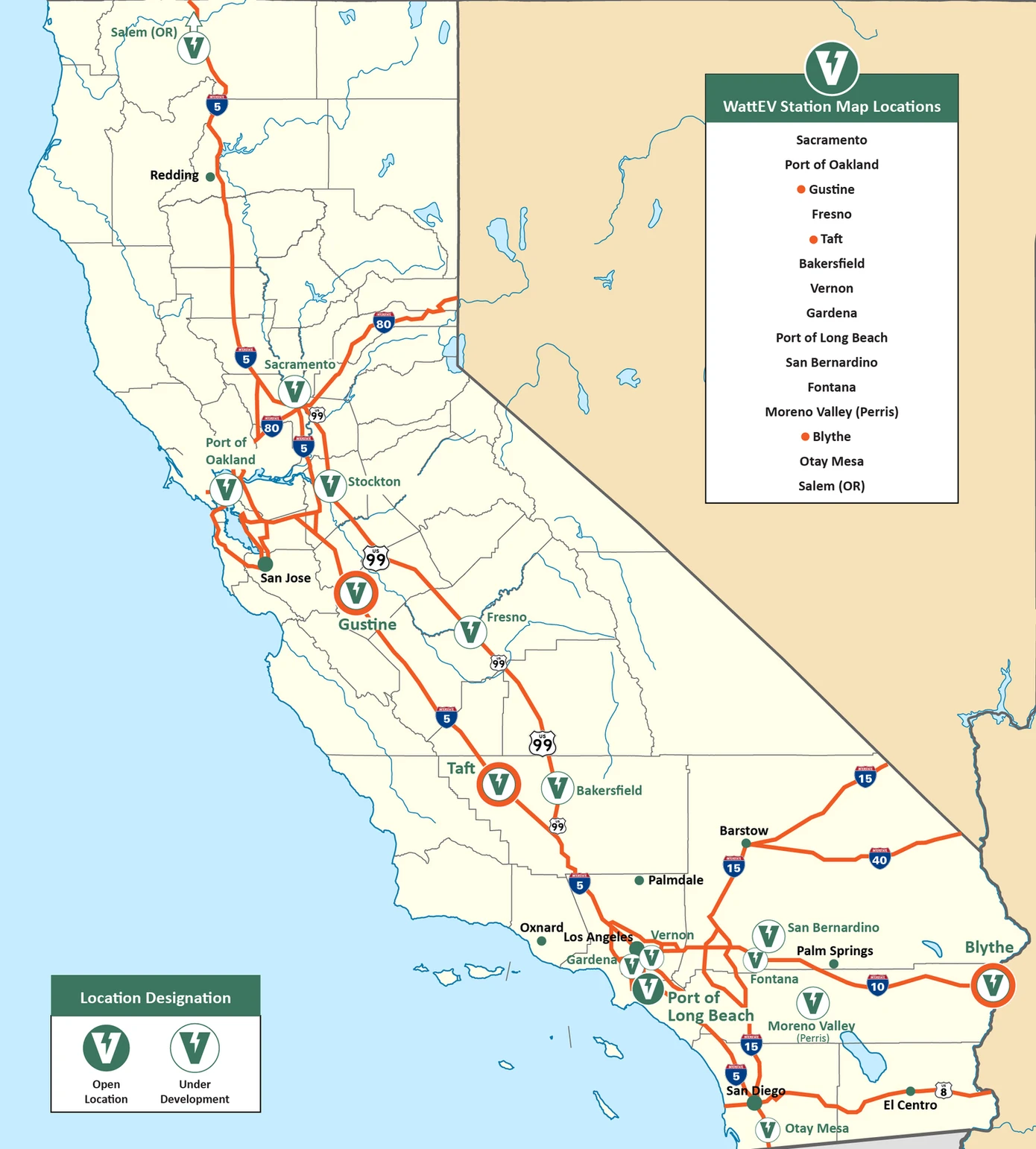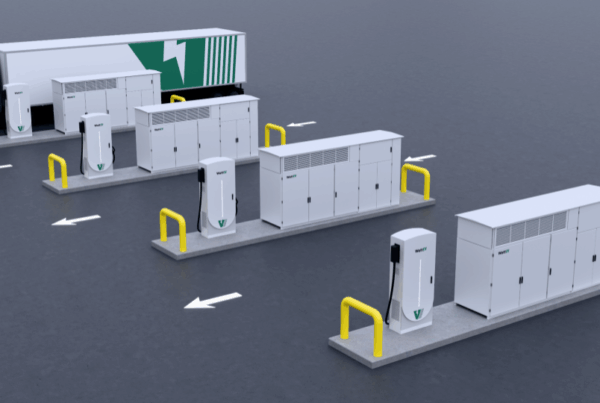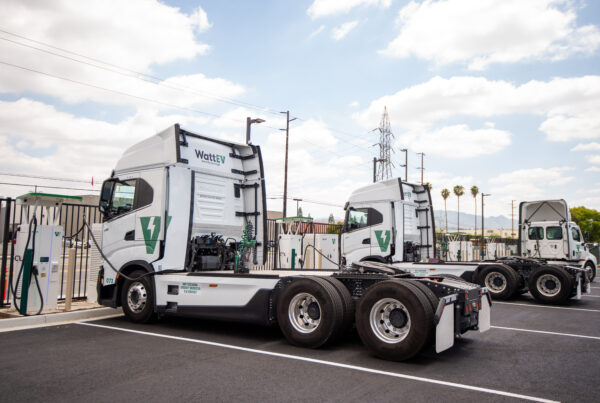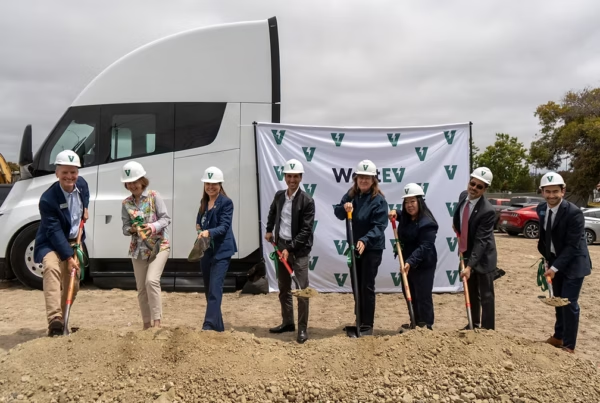LONG BEACH, Calif., Jan. 17, 2024 (GLOBE NEWSWIRE) — WattEV, the nation’s leading medium- and heavy-duty electric truck charging infrastructure developer, was awarded a total of $75.6 million from the U.S. Federal Highway Administration (FHWA) to build three additional commercial electric truck charging depots in California, in partnership with the San Joaquin Valley Air Pollution Control District (APCD) and the City of Blythe. Notably, these grant awards, dedicated to establishing stations along crucial freight transportation corridors in California, stand as the most significant financial allocation in this FHWA grant cycle for any individual charging infrastructure developer across the nation.
“The FHWA funding awards come on the heels of the company receiving $33.6 million in late 2023 from the Transportation Corridor Enhancement Program, bringing WattEV’s total recent federal funding awards to $109 million,” stated WattEV CEO Salim Youssefzadeh.
“These substantial investments from the federal government play a pivotal role in advancing the development of essential public truck charging infrastructure, a key factor for the success of commercial freight electrification on the West Coast and beyond. Our team takes immense pride in leading this build-out from San Diego to Seattle, and now venturing east toward Arizona and beyond,” Youssefzadeh continued.
In support of its mission to accelerate the transition to zero-emission transport solutions, WattEV has spent the past three years launching the first corridor for public-access medium- and heavy-duty electric vehicle (MHDEV) charging. In addition, WattEV offers an innovative electric Truck-as-a-Service (TaaS) model that provides fleets with access to Class 8 battery-electric trucks, reliable maintenance support, insurance, and access to charging across WattEV’s entire network, all at a total cost of operation on par with diesel trucks. Last November, Apollo-managed funds and Vitol announced significant structured debt and equity investments to accelerate the Company’s growth trajectory.
To further its ambitious zero-emission transportation goals, WattEV successfully secured two separate grants through the FHWA’s Charging and Fueling Infrastructure Discretionary Grant Program (CFI) 2023-24 grant cycle, announced late last week.
Its first CFI grant of $56 million, which was awarded to both WattEV and San Joaquin Valley APCD, was the single largest FHWA award among 10 granted to California projects. The funding will be used to develop two state-of-the art truck charging sites in Taft and Gustine, California, to support zero-emissions goods movement along the heavily traveled I-5 freight corridor which connects the nation’s most productive agricultural region to major ports. The Valley’s substantial volume of heavy-duty freight has led to its designation by the Environmental Protection Agency (EPA) as an extreme nonattainment area for ozone and nonattainment for PM2.5, underscoring the urgent need for sustainable solutions in the region.
“A robust infrastructure network is essential for a zero-emissions future, and collaborations with industry and federal partners will be key to California’s success,” said Liane Randolph, Chair of the California Air Resources Board (CARB). “The federal funds will help accelerate the deployment of commercial truck charging depots such as those that WattEV has planned across the state, giving truckers the tools they need to do their part for cleaner air and healthier communities.”
At full capacity, both the Taft and Gustine sites will enable charging for more than 46,000 trucks annually with a total of 175 CCS chargers, and more than 38,000 trucks annually with a total of 17 MCS chargers. The two sites will incorporate a combined 63 acres of solar panels and integrate 5.5 MWh of battery electric storage systems. This strategic inclusion aims to ensure grid stability and optimize overall pricing for WattEV’s customers, reinforcing the company’s commitment to sustainable and cost-effective charging solutions.
“We appreciate the leadership of WattEV and strong support of the Federal Highway Administration in helping to move forward nation-leading efforts to deploy the next generation of zero-emissions freight infrastructure in the San Joaquin Valley,” stated Samir Sheikh, Executive Director and Air Pollution Control Officer for the San Joaquin Valley APCD. “This funding award is a significant milestone for the region and state as a whole and is a testament to the San Joaquin Valley APCD’s commitment to reducing air pollution, improving public health, and supporting the Valley’s economy.”
The second CFI grant of $19.6 million, awarded to the City of Blythe and WattEV as project partners, is earmarked for the establishment of a publicly accessible, multi-class electric vehicle charging facility on a 127-acre parcel of land in Riverside County, California, near the state line with Arizona. By introducing this electric truck charging facility along the I-10 freight corridor, WattEV and the City of Blythe are contributing to the broader shift toward sustainable transportation for the western United States, aligning with environmental goals and supporting interstate electric truck commerce.
At full capacity, the Blythe station will enable charging for more than 46,000 trucks annually with 30 CCS chargers, and more than 38,000 trucks annually with six MCS chargers. The site will also feature 5.2 MW of renewable energy capacity from an onsite photovoltaic field and a 2.75 MW battery energy storage system.
“WattEV is leading the industry in adoption of the new MCS charging standard, enabling rapid recharging at our depots for semi-trucks, with as much as 300-miles of range in just 20 minutes,” Youssefzadeh noted. “We anticipate that the rollout of MCS charging will fundamentally shift the way that truck drivers view the viability of electric trucks for longer freight routes.”
The FHWA grants will enable WattEV to further expand its MCS charging network, which will help truck drivers maximize their uptime by recharging and getting back out on their routes quickly. WattEV’s first MCS chargers will debut in early 2024 at its soon-to-open Bakersfield charging depot, funded in part by the California Energy Commission.
WattEV’s California Charging Network Map

To learn more about WattEV, visit www.WattEV.com.
About WattEV
WattEV’s mission is to accelerate the transition of U.S. trucking transport to zero emissions. Through a combination of business and technology innovations, WattEV creates charging infrastructure and data-driven workflows, providing truckers and fleet operators with the lowest total cost of ownership. WattEV’s goal is to get 12,000 heavy-duty electric trucks on California roads by the end of 2030, exceeding existing forecasts. More information is available online at WattEV.com.
WattEV Media Contact
Michael Coates
WattEV
408.399.9081




